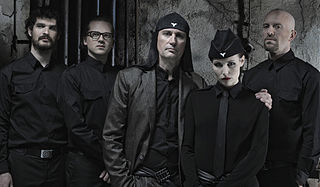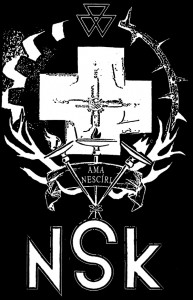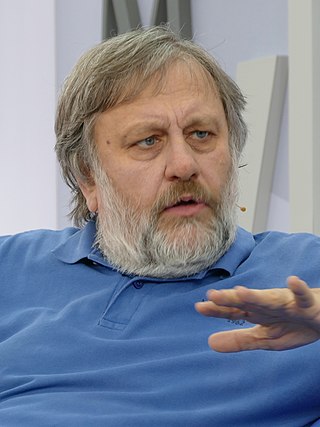Related Research Articles
The following outline is provided as an overview of and topical guide to critical theory:

Jacques Marie Émile Lacan was a French psychoanalyst and psychiatrist. Described as "the most controversial psycho-analyst since Freud", Lacan gave yearly seminars in Paris, from 1953 to 1981, and published papers that were later collected in the book Écrits. Transcriptions of his seminars, given between 1954 and 1976, were also published. His work made a significant impact on continental philosophy and cultural theory in areas such as post-structuralism, critical theory, feminist theory and film theory, as well as on the practice of psychoanalysis itself.
Postmodern music is music in the art music tradition produced in the postmodern era. It also describes any music that follows aesthetical and philosophical trends of postmodernism. As an aesthetic movement it was formed partly in reaction to modernism but is not primarily defined as oppositional to modernist music. Postmodernists question the tight definitions and categories of academic disciplines, which they regard simply as the remnants of modernity.

Laibach is a Slovenian and Yugoslav avant-garde music group associated with the industrial, martial, and neo-classical genres. Formed in the mining town of Trbovlje in 1980, Laibach represents the musical wing of the Neue Slowenische Kunst (NSK) collective, a group which Laibach helped found in 1984.

Neue Slowenische Kunst is a political art collective that formed in Slovenia in 1984, when the Socialist Republic of Slovenia was part of Socialist Federal Republic of Yugoslavia. NSK's name was chosen to reflect the theme in its works of the complicated relationship Slovenes have had with Germans. The name of NSK's music wing, Laibach, is also the German name of the Slovene capital Ljubljana. The name created controversy because some felt it evoked memories of the Nazi annexation of Slovenia during the Second World War. It also refers to Slovenia's previous seven centuries as part of the Habsburg monarchy.

Slavoj Žižek is a Slovenian philosopher, cultural theorist and public intellectual. He is international director of the Birkbeck Institute for the Humanities at the University of London, visiting professor at New York University and a senior researcher at the University of Ljubljana's Department of Philosophy. He primarily works on continental philosophy and political theory, as well as film criticism and theology.
In the minds of many foreigners, Slovenian folk music means a form of polka that is still popular today, especially among expatriates and their descendants. However, there are many styles of Slovenian folk music beyond polka and waltz. Kolo, lender, štajeriš, mafrine and šaltin are a few of the traditional music styles and dances.

Fredric Jameson is an American literary critic, philosopher and Marxist political theorist. He is best known for his analysis of contemporary cultural trends, particularly his analysis of postmodernity and capitalism. Jameson's best-known books include Postmodernism, or, The Cultural Logic of Late Capitalism (1991) and The Political Unconscious (1981).
IRWIN is a collective of Slovenian artists, primarily painters, and an original founding member of Neue Slowenische Kunst (NSK).
In continental philosophy, the Real refers to the remainder of reality that cannot be expressed, and which surpasses reasoning. In Lacanianism, it is an "impossible" category because of its opposition to expression and inconceivability. The Real Order is a topological ring (lalangue) and ex-ists as an infinite homonym.
[T]he real in itself is meaningless: it has no truth for human existence. In Lacan's terms, it is speech that "introduces the dimension of truth into the real."
Sinthome is a concept introduced by Jacques Lacan in his seminar Le sinthome (1975–76). It redefines the psychoanalytic symptom in terms of the role of the subject outside of analysis, where enjoyment is made possible through creative identification with the symptom.

The Fright of Real Tears: Krzysztof Kieślowski Between Theory and Post-Theory is a 2001 book by the Slovenian philosopher Slavoj Žižek which uses free associative film interpretation to tangentially examine the films of Polish director Krzysztof Kieślowski while avoiding the debate between cognitive film theory and psychoanalytic film theory. It was published by the British Film Institute in 2001.

Rastko Močnik is a Slovenian sociologist, psychoanalyst, literary theorist, translator and political activist. Together with Slavoj Žižek and Mladen Dolar, he is considered one of the co-founders of the Ljubljana school of psychoanalysis.
Fuck for the Heir Puppy Bear! was a political-artistic performance staged by Russian performance group Voina at the Timiryazev State Biological Museum in Moscow in February 2008.
This is a list of articles in contemporary philosophy.
This is a list of articles in continental philosophy.
Post-politics refers to the critique of the emergence, in the post-Cold War period, of a politics of consensus on a global scale: the dissolution of the Eastern Communist bloc following the collapse of the Berlin Wall instituted a promise for post-ideological consensus. The political development in post-communist countries went two different directions depending on the approach each of them take on dealing with the communist party members. Active decommunisation process took place in Eastern European states which later joined EU. While in Russia and majority of former USSR republics communists became one of many political parties on equal grounds.

Duane Rousselle is a Canadian sociological theorist, Lacanian psychoanalyst, and Professor of Sociology. He works in several academic fields including Social Movement Studies, Lacanian Psychoanalysis, Cultural Sociology, Gender and Sexuality Studies, Anarchist Studies, and Continental Philosophy. His work attempts to introduce an alternative to scholarly discourses that aim to produce consistent and coherent bodies of knowledge. It also offers a counterpoint to what Jacques Lacan has called "capitalist discourse."

"The Discovery of Morniel Mathaway" is a science fiction short story written by William Tenn and first published in Galaxy Science Fiction in October 1955.
References
- ↑ Inke Arns & Sylvia Sasse. Subversive Affirmation. On Mimesis as Strategy of Resistance. Editorial, spring 2006 issue of Maska, Ljubljana
- ↑ Sylvia Sasse and Caroline Schramm. Totalitäre Literatur und subversive Affirmation. Welt der Slaven, 42, 1997, p. 306-327
- 1 2 Inke Arns and Sylvia Sasse. Subversive Affirmation. On Mimesis as Strategy of Resistance. In: IRWIN: East Art Map, London / Ljubljana 2005
- ↑ Slavoj Žižek, 'Why Are Laibach and Neue Slowenische Kunst Not Fascists?' in The Universal Exception: Selected Writings, Volume Two (London: Continuum, [1993] 2006) 63-66.
- ↑ Stafylakis, Kostis. "Moralism and the (Greek) Crisis of Cultural Resistance: An Anti-Humanist Approach".
{{cite journal}}: Cite journal requires|journal=(help) - ↑ BAVO, ed. Cultural Activism Today: The Art of Over-Identification (Rotterdam: Episode, 2007); see http://www.bavo.biz, https://www.academia.edu/4310492/_Cultural_Activism_Today_Strategies_of_Over-identification._book_review._OPEN._14
- ↑ "Good Old Avant-Garde". 5 July 2013.
- ↑ Marc James Léger, Brave New Avant Garde: Essays on Contemporary Art and Politics (Winchester, UK: Zero Books, 2012) http://www.zero-books.net/books/brave-new-avant-garde
- ↑ Fredric Jameson, 'Hans Haacke and the Cultural Logic of Postmodernism' in Brian Wallis, ed. Hans Haacke: Unfinished Business (Cambridge: The MIT Press, 1986) 39-51.
- ↑ Fredric Jameson, Postmodernism, or, The Cultural Logic of Late Capitalism (Durham: Duke University Press, 1991).
- ↑ Slavoj Žižek, ed. Mapping Ideology (London: Verso, 1994).